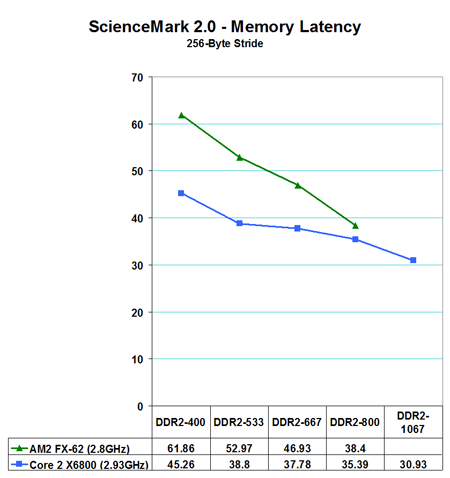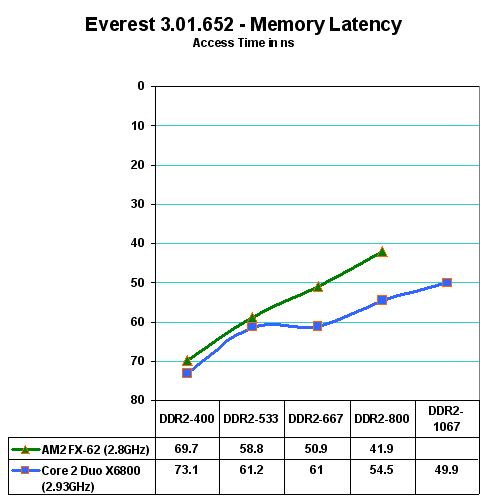A Closer Look at Latency and Scaling
As was explained in the Core 2 Duo launch review, Core 2 Duo has not physically added a memory controller on the processor. The memory controller is still part of the motherboard chipset that drives Core 2 Duo. Intel added features that perform intelligent look-aheads on the memory controller to behave like lower latency. As you saw on pages 2 and 3, ScienceMark 2.0 shows the "intelligent look-aheads" in Core 2 Duo to be extremely effective, with Core 2 Duo memory now exhibiting lower apparent latency than AM2. However, not all latency benchmarks show the same results. Everest from Lavalys shows latency improvements in the new CPU revisions, but it shows Latency more as we would expect in evaluating Conroe. For that reason, our detailed benchmarks for latency will use both Everest 1.51.195, which fully supports the Core 2 Duo processor, and ScienceMark 2.0.
Latency, or how fast memory is accessed, is not a static measurement. It varies with memory speed and generally improves (goes down) as memory speed increases. To better understand what is happening with memory accesses we first looked at Sciencemark 2.0 Latency on both AM2 and Conroe.

ScienceMark shows Conroe Latency with a 45ns to 61ns lead at DDR2-400. Latency continues to decrease as memory speed increases with Core 2 Duo, reaching a value of about 30ns at DDR2-1067. The Trend line for AM2 is steeper than Core 2 Duo, increasing at a rapid rate until latency is virtually the same at DDR2-800.
It is very interesting that ScienceMark shows lower latency on Core 2 Duo than AM2, since we all know the on-chip AM2 controller has to be faster. We thought perhaps it was because all of the tested memory accesses could be contained in the shared 4MB cache of Core 2 Duo, but Alex Goodrich,one of the authors of ScienceMark, states that Version 2 is designed to test up to 16MB of memory, forseeing the day of larger caches. In addition he states the Core 2 duo prefetcher is clever enough to pick up all the patterns ScienceMark uses to "fool" hardware prefetchers. ScienceMark plans a revision with an algoritm that is harder to fool, but Alex commented that Conroe fooling their benchmark was "in itself a great indicator of performance".

Everest uses a different algorithm for measuring Latency, and it shows the on-chip AM2 DDR2 controller in the lead at all memory speeds, with Latency almost the same at the Core 2 Duo memory speed range of DDR2-400 to DDR2-533. However, the Everest trend lines are similar to those in ScienceMark, in that AM2 latency improves at a steeper rate than Core 2 Duo as memory speed increases.
The point to the Latency discussion is that, as expected, AMD has much more opportunity for performance improvement with memory speed increases in AM2. Intel will eventually reach the point, if the lines were extended, where they would have to move to an on-chip memory controller to further improve latency. This is not to take anything away from Intel's intelligent design on Core 2 Duo. They have found a solution that fixes a performance issue without requiring an on-chip controller - for now.
As was explained in the Core 2 Duo launch review, Core 2 Duo has not physically added a memory controller on the processor. The memory controller is still part of the motherboard chipset that drives Core 2 Duo. Intel added features that perform intelligent look-aheads on the memory controller to behave like lower latency. As you saw on pages 2 and 3, ScienceMark 2.0 shows the "intelligent look-aheads" in Core 2 Duo to be extremely effective, with Core 2 Duo memory now exhibiting lower apparent latency than AM2. However, not all latency benchmarks show the same results. Everest from Lavalys shows latency improvements in the new CPU revisions, but it shows Latency more as we would expect in evaluating Conroe. For that reason, our detailed benchmarks for latency will use both Everest 1.51.195, which fully supports the Core 2 Duo processor, and ScienceMark 2.0.
Latency, or how fast memory is accessed, is not a static measurement. It varies with memory speed and generally improves (goes down) as memory speed increases. To better understand what is happening with memory accesses we first looked at Sciencemark 2.0 Latency on both AM2 and Conroe.

ScienceMark shows Conroe Latency with a 45ns to 61ns lead at DDR2-400. Latency continues to decrease as memory speed increases with Core 2 Duo, reaching a value of about 30ns at DDR2-1067. The Trend line for AM2 is steeper than Core 2 Duo, increasing at a rapid rate until latency is virtually the same at DDR2-800.
It is very interesting that ScienceMark shows lower latency on Core 2 Duo than AM2, since we all know the on-chip AM2 controller has to be faster. We thought perhaps it was because all of the tested memory accesses could be contained in the shared 4MB cache of Core 2 Duo, but Alex Goodrich,one of the authors of ScienceMark, states that Version 2 is designed to test up to 16MB of memory, forseeing the day of larger caches. In addition he states the Core 2 duo prefetcher is clever enough to pick up all the patterns ScienceMark uses to "fool" hardware prefetchers. ScienceMark plans a revision with an algoritm that is harder to fool, but Alex commented that Conroe fooling their benchmark was "in itself a great indicator of performance".

Everest uses a different algorithm for measuring Latency, and it shows the on-chip AM2 DDR2 controller in the lead at all memory speeds, with Latency almost the same at the Core 2 Duo memory speed range of DDR2-400 to DDR2-533. However, the Everest trend lines are similar to those in ScienceMark, in that AM2 latency improves at a steeper rate than Core 2 Duo as memory speed increases.
The point to the Latency discussion is that, as expected, AMD has much more opportunity for performance improvement with memory speed increases in AM2. Intel will eventually reach the point, if the lines were extended, where they would have to move to an on-chip memory controller to further improve latency. This is not to take anything away from Intel's intelligent design on Core 2 Duo. They have found a solution that fixes a performance issue without requiring an on-chip controller - for now.










118 Comments
View All Comments
duploxxx - Thursday, July 27, 2006 - link
please give us edit...powerconsumption is only less in 100% load.... when powermode kicks in the amd is much less consuming... how long do you think a system runs in powermode against full load....
duploxxx - Thursday, July 27, 2006 - link
wrong... the conroe gains from the memory speed the amd more thats a fact... the ones you are referring to are probably 4200 and 5000, well we can say that they perfrom better when using 533/667 because then they don't have the devider issue running the memory on 742 in stead of 800.so the performance/price ratio on those chips is better with 553/667
zsdersw - Thursday, July 27, 2006 - link
Conroe's performance isn't merely a function of memory bandwidth or memory speed.PeterR - Tuesday, July 25, 2006 - link
If you could actually go out and BUY one ?Peter R.
michal1980 - Tuesday, July 25, 2006 - link
Wow. AMD fanboi's pulling out all the crap that the intel fanboi's have pulled in the past.wake up!. Right now, Intel core 2 duo is faster then AMD 64 right now.
Its like video card fanboi's but worse, because the difference here is clear.
If I was building a gaming rig this year, I would build with a core 2 duo.
Just like a few months ago, it would be with an AMD 64.
I go with what company is faster. I used both nvidia cards, and ati Cards. I use pentiums, and p2's, I used athlon xp's when you over clock them 50% ease and they were dirt cheap. I use a opty dual core right now because it was faster then the p4's. I use p-m lappys because of performance/battery life.
If I was building a rig right now. I'd switch to an intel Core 2 duo. Why? because its faster. I could care less about who makes it.
if apple comes out tommorow with a magic pc that runs all pc games run 20% faster, I'm buying an apple.
Pirks - Tuesday, July 25, 2006 - link
I'd buy a iMac or Mac Pro right this second if it were running all PC games at all without rebooting between OS X and XP.yacoub - Tuesday, July 25, 2006 - link
Two things:1 - I think I like the new font used in tables and charts.
2 - In the SuperPi chart you say Lower is Better but then inverse the graph such that it is actually the line higher on the graph that is better. Unless the reader looks closely at the numbers, they could infer that the AMD chip wipes the floor with the Conroe.
redbone75 - Tuesday, July 25, 2006 - link
Seriously, though, here we have a completely new architecture from Intel, the same Intel that is this massive company with enormous resources and huge R&D departments, and these AMD fanboys are still all upset because Intel has not only achieved parity with but also exceded AMD in performance. Come to think of it, this is the exact same argument that AMD fans were using when preliminary benchmarks came out on Conroe. "It's not fair to compare Intel's new architecture to AMD's old one, because they have an advantage." Hey, you want some cheese with that wine? I'll tell you what: AMD enjoyed the performance lead for a while. Now, Intel is having a go at it and, with any luck, AMD will come out on top in the future, at least I really hope so. Why do I hope so? Do any of you think AMD would have lowered their processor prices so much if Conroe wasn't such a threat? Do you think Intel would have released Conroe at these prices if they didn't have to take back the crown from AMD? Hey, with the X2's we still get a great range of processors at much lower prices. Hell, even the Pentium D's are going to be attractive at lower prices. That makes me happy, not some benchmarks saying this processor is faster than that processor. And really, I don't know about you but I don't care about which processor wins memory latency benches, I only care about the end performance in applications I actually use.DigitalFreak - Tuesday, July 25, 2006 - link
Amen, brother!TravelMug - Tuesday, July 25, 2006 - link
As said by several people before - you are not testing latency but the prefetch abilites of the CPU. Same has been said about the original Conroe article, you don`t seem to listen though."Everest from Lavalys shows latency improvements in the new CPU revisions, but it shows Latency more as we would expect in evaluating Conroe. For that reason, our detailed benchmarks for latency will use both Everest 1.51.195, which fully supports the Core 2 Duo processor, and ScienceMark 2.0."
Really? That is a 2 years old version, there have been countless new version since then. Also, if that version "fully supports" the Core 2 Duo processor, how come this is what the developer says about the latest version 3.01?:
http://www.lavalys.com/products/whatsnew.php?pid=3...">Support for Intel Core 2 "Conroe" and "Merom" processors